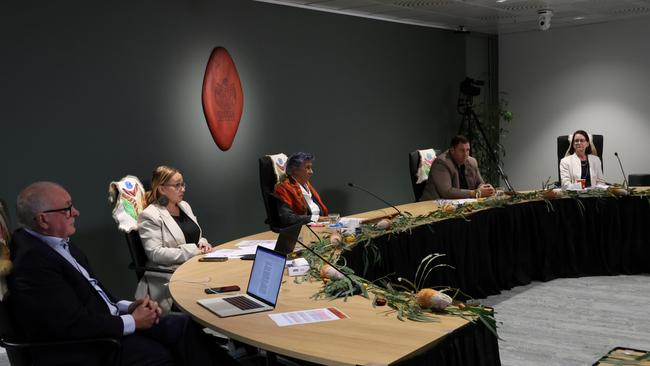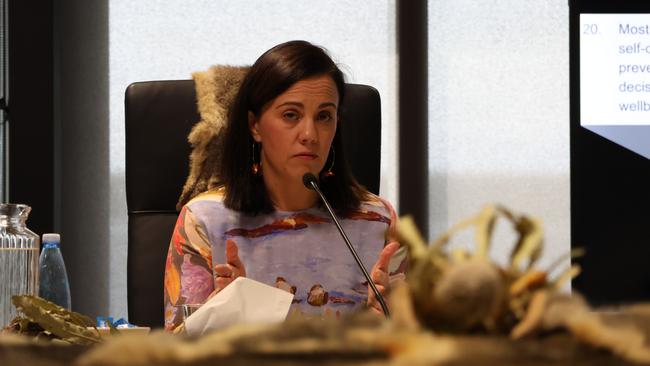Yoorrook Justice Commission releases first report from Victoria’s truth-telling commission
Proposals from the state Royal Commission into the treatment of Indigenous Victorians include calls to overhaul the justice system — with experts and elders labelling them “a form of apartheid”.

Victoria
Don't miss out on the headlines from Victoria. Followed categories will be added to My News.
A raft of proposals from the state Royal Commission into the treatment of Indigenous Victorians includes calls to overhaul the state’s justice system, with experts and elders labelling the recommendations “absolute nonsense” and “a form of apartheid”.
The report also called for a ban on jailing offenders under the age of 16, and lifting the age of criminal responsibility – including for serious crimes like murder – to the age of 14.
The Yoorrook Justice Commission – an independent body probing law and policies in Victoria that impact Indigenous Victorians – released its final report on Monday after many people said they were being treated unfairly by the state’s justice system.
The commission suggested the state adopt a totally separate child protection system for Aboriginal kids, and recommended implementing different ways to deal with Aboriginal offenders.

A statewide expansion of the Koori family court was suggested along with allowing Indigenous representatives to quiz future Chief Commissioners of Police about colonisation and racism.
Regarding changing the age of criminal responsibility, former Victoria Police commissioner Kel Glare, now chair of the Community Advocacy Alliance Incorporated group, slammed the suggestion as “absolute nonsense”.
“If you’re shot by a 13-year-old, you’re just as dead if you’re shot by a 31-year-old. All actions must have consequences,” he said.
The Andrews Government is considering the 46 recommendations handed down, but some of the more contentious recommendations have prompted backlash from Aboriginal advocates, who warned against a two-system approach.
Indigenous affairs academic and commentator Anthony Dillon said “insisting on Indigenous people providing services for Indigenous people” would lead to separatism.
“Separate development and focusing on differences is never the solution – it is the problem,” he said.
“Those Indigenous Australians who have done well, have done so because they did not keep themselves separate from mainstream Australia.”
Wurundjeri elder Ian Hunter told the Herald Sun: “It’s a form of apartheid.”
“When are the people that call themselves Indigenous Victorians, going to also call themselves Australians? Is The Voice heading in this direction? This idea that it’s them and us?”
Deputy commission chair Sue-Anne Hunter said the truth-telling inquiry identified a “broken” child protection and criminal justice system in Victoria, and warned First Peoples’ would continue to be failed without “transformational change”.
“At the heart of that is self determination for First Peoples in this state,” she said.
“Self determination entails transferring power, resources and control to First Peoples’ so that we can design, establish, and manage systems and services that empower our families and communities to thrive.”
The report set a tight deadline for action calling on the government to implement most of the changes within 12 months.
It warned consultation and lack of resources was not an “excuse for delay”.
The commission made clear that the report handed down was only considered a high-level document, with any final design of policies and laws to be decided under Treaty before progressing in Victoria – a process that would require lengthy consultation with local Indigenous groups.
Nationals leader and the Coalition’s Aboriginal Affairs spokesman Peter Walsh said everyone was equal before the law and a “holistic approach” would be more successful in closing the gap.
Supreme Court justice and Chair of Courts Council, Anne Ferguson, said the court system would “absorb” the report and “look at what is within our power to change”.
Victoria Legal Aid CEO Louise Glanville said the report signalled a “critical moment” for Victorians to understand the depths of harms caused to First Peoples by state systems.
The report also called for a new police watchdog – headed up by someone who hadn’t served with police – to investigate complaints about cops, monitor custody, and audit police powers.
The Yoorrook Justice Commission report was created after the commission took 33 submissions and heard from 84 witnesses.



